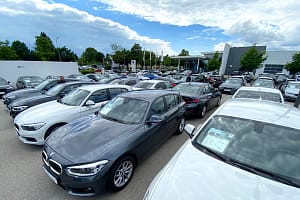Why electric vehicles need to be a major priority for our cities
This is an idea from our Securing Britain: Responsible Business series – discover more ideas now
The car industry is in the midst of a revolution. On the one hand, smartphone technology facilitates car-sharing and makes drivers-for-hire of anybody with a vehicle. This reduces the need for car ownership, and also threatens the survival of the taxi trade.
Meanwhile, major advances in alternative energy and electric vehicle (EV) technology, often inspired by concerns for the environment, pose a challenge to vehicle manufacturers and energy supply industries. They also pose a challenge to the transport and energy infrastructures on which those industries depend. Driverless vehicles will cause a further transformation in car ownership and the “driving jobs economy”.
By reinventing Britain as a centre of innovation and harnessing a focused approach that ties innovative excellence closely to sustainability, we may well position ourselves better in the long run than our current broad-brush approach.
Urban ground transportation, then, is an obvious sector to prioritise. The urgent need for reduced congestion, improved air quality and increased economic productivity in and between our cities – not to mention more abstract notions of national morale and self-esteem – is unarguable.
What better opportunity to drive this strategy than the private car revolution? Britain’s size and existing ground transport infrastructure – road systems, electricity network and service stations –make us better placed than most to implement the urban charging infrastructure that a successful EV industry needs. The overall cost – economic, let alone environmental and political – would likely be less than the HS2 rail project alone.
At the same time, our international transport links and other well documented attributes make us an attractive venue for the talent and investment such a strategy requires. Not only for the EVs of today, but for the mass migration to driverless vehicles tomorrow – quite possibly not more than 10 years away. Making Britain the leading nation in this sector would generate rapid returns on investment on all levels.
In May 2009, Boris Johnson trumpeted London’s place at the forefront of road transport electrification in his Electric Vehicle Delivery Plan for London framework. But since then, only 1,400 operational charging stations have been installed, compared to original targets of 25,000 by 2015. EV uptake has shown the acceleration of a milk float: just 1,728 cars out of the two million plus cars sold in the UK last year were EVs.
There are a number of reasons for this. Firstly, not all charging stations are compatible with all EVs. Secondly, there is not yet a mapping technology showing EV-drivers which charging points are compatible or whether they are in use – though it is coming soon. Both issues have hindered greentomatocars’ own plans to launch the capital’s first fully electric fleet, and are clearly a big part of the problem.
Government and business must work together, and fast, to address these shortcomings and to jump-start the electrification of London’s ground transport industry, let alone Britain’s.
As with many revolutions, it’s too early to tell what the private car industry will look like after this is all over. But cities transformed into harmonious hubs of self-driving EVs and other non-petrol cars, all moving us with optimal efficiency along induction-loop roads is a compelling vision.
One thing is clear: for a responsible and robust future, we need local and central government, industry and business to come together for the greater good. Only by overcommitting to the electrification of urban and road transport can we drive Britain anywhere close to where she needs to be.
Jonny Goldstone us the co-founder of greentomatocars London and vice president of greentomatocars International
This is an idea from our Securing Britain: Responsible Business series – discover more ideas now







Leave a Comment